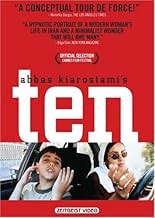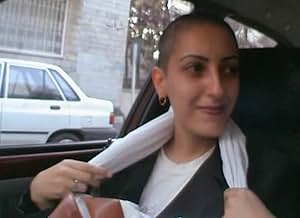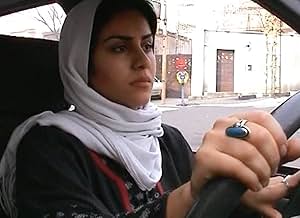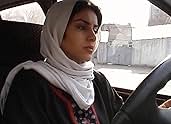CALIFICACIÓN DE IMDb
7.4/10
8.9 k
TU CALIFICACIÓN
Agrega una trama en tu idiomaA visual social examination in the form of ten conversations between a driving woman and her various pick-ups and hitchhikers.A visual social examination in the form of ten conversations between a driving woman and her various pick-ups and hitchhikers.A visual social examination in the form of ten conversations between a driving woman and her various pick-ups and hitchhikers.
- Dirección
- Guionista
- Elenco
- Premios
- 1 premio ganado y 4 nominaciones en total
Amina Maher
- Amin
- (as Amin Maher)
Roya Akbari
- Prostitute + Lover
- (as Roya Arabshahi)
- Dirección
- Guionista
- Todo el elenco y el equipo
- Producción, taquilla y más en IMDbPro
Opiniones destacadas
10nycterr
The film shows ten rides of a female cab-driver in modern Teheran. The protagonist (a sunglasses-wearing beautiful woman) share a ride with her son, her sister, an old faithful lady, a prostitute and a female stranger. She discuss life and social issues, and repeatedly argue with her son about her recent divorce with the boy's dad.
The movie is technically interesting and well shaped.
---- Structure The film rolls the 10 sequences introduced by a a classic old school countdown which creates a sense of formal structure, giving the film an apparent "rigid" putting the audience as "analyst".
---- Camera and Sound Only two camera angles are used in the film (beside an odd little part where we see the prostitute outside of the car ...). And the sound is very basically real and full (city's life and traffic).
---- Content But above all, despise what some will say about the apparent boringness of the film, the content is amazingly absorbing. The issues raised are universal (divorce, women's position in society, love, despair, faith ...) and perfectly rendered by these non-actors.
One last point, the female protagonist is BEAUTIFUL !
The movie is technically interesting and well shaped.
---- Structure The film rolls the 10 sequences introduced by a a classic old school countdown which creates a sense of formal structure, giving the film an apparent "rigid" putting the audience as "analyst".
---- Camera and Sound Only two camera angles are used in the film (beside an odd little part where we see the prostitute outside of the car ...). And the sound is very basically real and full (city's life and traffic).
---- Content But above all, despise what some will say about the apparent boringness of the film, the content is amazingly absorbing. The issues raised are universal (divorce, women's position in society, love, despair, faith ...) and perfectly rendered by these non-actors.
One last point, the female protagonist is BEAUTIFUL !
I have seen many impressive Iranian films over the years. "Ten" may be the very best of them for a variety of reasons. I think the film is remarkable because it looks so simple, but I imagine setting up the camera and capturing the realistic dialogue and plot-line we see in the film had to have taken a lot of preparation. I also think the director deliberately chose scenery to accommodate the backdrop of the film, and he must have driven around Teheran constantly to figure out which images to put in the background. I think the scenes with the murals of new arch-conservative president are very telling. "Ten" seems to have a lot of messages under the radar, including the subversive powers of all governments (certainly including our own in America) to censor art. I think the relationship between the mother and her son is a very poignant one, and it shows how children and adults simply live in different spheres of the universe. Film is strikingly similar in some aspects to American independent filmmaker Rob Nilsson's film "Signal 7" which came out over 20 years ago.
Ten is an intriguing movie. Kiarostami explores the abilities of digital camera by mounting it at just two fixed angles on the dashboard of a car, showing us almost only the driver's and the passenger's faces. Such a stationary structure surprises by its moving content, which takes shape as the movie unfolds.
The driver is a young Iranian divorcée, recently remarried, whose conversations with a son, sisters, a young and an old woman makes up the ten episodes of the movie.
The performance taken from the kid is astonishingly natural, and other characters also appear to be just playing their everyday lives. Kiarostami opens an eye through the little gap of its two fixed digital cameras on the mundane facts of the Iran's capital life as experienced by a typical middle-class woman. The plots are so natural no one can find a better way of experiencing the knotted, contradictory complexity of such a woman's life in Iran from outside. The flow is of the scenes is smooth and the dialogues are, at least to the Iranian audience, courageous and funny, though familiar at the same time. It's a movie worth watching more than once.
The driver is a young Iranian divorcée, recently remarried, whose conversations with a son, sisters, a young and an old woman makes up the ten episodes of the movie.
The performance taken from the kid is astonishingly natural, and other characters also appear to be just playing their everyday lives. Kiarostami opens an eye through the little gap of its two fixed digital cameras on the mundane facts of the Iran's capital life as experienced by a typical middle-class woman. The plots are so natural no one can find a better way of experiencing the knotted, contradictory complexity of such a woman's life in Iran from outside. The flow is of the scenes is smooth and the dialogues are, at least to the Iranian audience, courageous and funny, though familiar at the same time. It's a movie worth watching more than once.
My experience with Iranian film is pretty superficial having only seen a handful, but none have disappointed me. I saw Kiarostami's early film Where Does The Friend Live? and was completely blown away. I then saw Saalam Cinema by Iran's other giant Mohsen Makhmalbaf - and then I realised just how important this country's output has been.
Ten did nothing to diminish this view, and I'll try not to repeat much of what's already been said here. I saw an Iranian person on this site claim that there was too much lost in the translation from Farsi to English. This is always the case with translation, but I am quite sure Ten gets away with it. I recently saw Ingmar Bergman's Saraband and if you think language being stilted ruins a movie then I am sure seeing that film will shatter the view. The single thing that destroys it in both cases is the incredible power of the acting - the truth lies in their facial expression. I am quite sure 9 out of 10 people asked without context would swear blind Ten was a documentary.
In the western world overrun by "reality" TV, its significance is lost on some, but if you take the time to realise that these people are actually acting - and more than likely doing it for the first time - thats where the power lies. Try taking this film, put it in America and put Hollywood A-Listers in the car and see where it goes. Basically, how you could call both what they do and what happens in this film acting is opened to debate. This is true of the majority of Iranian output.
Ten would be significant for these reasons alone, but when you take into account how much insight you gain into the life of a woman in there who tries to say no to male domination and to "love herself" it really comes into its own. This is the case of much of this countries output - and what sets is far apart from other countries. What we learn ultimately is this struggle, though perhaps more explicit in Iran, is a struggle felt by all women in the world. It's a film which in that way unites rather than divides which in light of Iran's current status in global affairs is what probably what makes it one of the more important Cinema's in the world.
Ten did nothing to diminish this view, and I'll try not to repeat much of what's already been said here. I saw an Iranian person on this site claim that there was too much lost in the translation from Farsi to English. This is always the case with translation, but I am quite sure Ten gets away with it. I recently saw Ingmar Bergman's Saraband and if you think language being stilted ruins a movie then I am sure seeing that film will shatter the view. The single thing that destroys it in both cases is the incredible power of the acting - the truth lies in their facial expression. I am quite sure 9 out of 10 people asked without context would swear blind Ten was a documentary.
In the western world overrun by "reality" TV, its significance is lost on some, but if you take the time to realise that these people are actually acting - and more than likely doing it for the first time - thats where the power lies. Try taking this film, put it in America and put Hollywood A-Listers in the car and see where it goes. Basically, how you could call both what they do and what happens in this film acting is opened to debate. This is true of the majority of Iranian output.
Ten would be significant for these reasons alone, but when you take into account how much insight you gain into the life of a woman in there who tries to say no to male domination and to "love herself" it really comes into its own. This is the case of much of this countries output - and what sets is far apart from other countries. What we learn ultimately is this struggle, though perhaps more explicit in Iran, is a struggle felt by all women in the world. It's a film which in that way unites rather than divides which in light of Iran's current status in global affairs is what probably what makes it one of the more important Cinema's in the world.
"Ten" really impressed me for many reasons. The first one is the interpretation of the non-professional actresses and the boy Amin Maher. It is simply amazing the first sequence (number 10) with fifteen minutes of dialogs between the lead character and her son without any cut. The second reason is the intense and impressive insight in the repressed women's world in Iran. I believe that most of the Westerns have no idea about the feelings and the culture of Iranian women, and Abbas Kiarostami shows very real dialogs picturing the lifestyle of a middle class woman and some samples in other women of different classes (the prostitute, the religious woman etc.). The third reason was the simplicity and the originality of the location: inside a car, with a divorced woman transporting her resented son; her sister; a prostitute; an old lady; and a romantic young woman, along different days. I would never imagine such a splendid scenario for a movie with such a theme. Last but not the least, the remarkable beauty of the face of the driver (Mania Akbari) is awesome: she is exotic for Brazilian standards, but really a very beautiful woman. My vote is eight.
Title (Brazil): "10 Dez" ("10 Ten")
Title (Brazil): "10 Dez" ("10 Ten")
¿Sabías que…?
- TriviaApart from Mania Akbari, actors are non-professional. The young boy is played by her own son and their relationship is partly based on real-life elements.
- ErroresCar windows, both driver's and passenger's, vary between being closed, part-open or open between shots.
- Citas
Prostitute: [to a Married woman] You are wholesailers. We are retailers.
- ConexionesFeatured in 10 on Ten (2004)
- Bandas sonorasWalking In The Air
Written and Performed by Howard Blake
© Chester Music Limited represented by Première Music Group
Selecciones populares
Inicia sesión para calificar y agrega a la lista de videos para obtener recomendaciones personalizadas
- How long is Ten?Con tecnología de Alexa
Detalles
- Fecha de lanzamiento
- Países de origen
- Sitio oficial
- Idioma
- También se conoce como
- Ten
- Locaciones de filmación
- Productoras
- Ver más créditos de la compañía en IMDbPro
Taquilla
- Total en EE. UU. y Canadá
- USD 105,990
- Fin de semana de estreno en EE. UU. y Canadá
- USD 10,559
- 9 mar 2003
- Total a nivel mundial
- USD 452,895
Contribuir a esta página
Sugiere una edición o agrega el contenido que falta

Principales brechas de datos
By what name was Dah (2002) officially released in India in English?
Responda




















